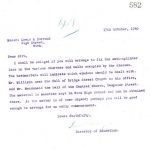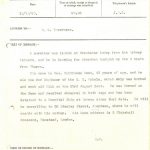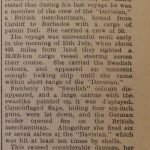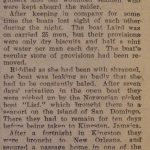Although Hitler had postponed indefinitely the planned invasion of Britain, the air raids on British cities continued: over 1,500 people were killed in raids in just seven days, including over 150 in London when a bomb landed on an air raid shelter. Also this week, Mussolini and his advisers took the decision to invade Greece, and Italian aircraft also bombed oil refineries in Bahrain.
 Now that Caithness schools were finally back, the safety of the children was obviously a key concern. It says a lot about the sense of danger from bombs that the Director of Education this week wrote for the “anti-splinter lace in the various churches and halls occupied by the classes” to be replaced, as a matter of urgency. As events would prove, within a few weeks that lace would be needed.
Now that Caithness schools were finally back, the safety of the children was obviously a key concern. It says a lot about the sense of danger from bombs that the Director of Education this week wrote for the “anti-splinter lace in the various churches and halls occupied by the classes” to be replaced, as a matter of urgency. As events would prove, within a few weeks that lace would be needed.

On 18 October a severely wounded survivor from a sunk merchantman landed at Scrabster on his way to his mother’s at Aberdeen,. “His name is Geo. Caithness Dean, 43 years of age, and he was the 2nd Engineer of the S.S. Makala, which ship was bombed and sunk off Wick on the 23rd August last. He was burned on the face and received shrapnel in both legs and has been detained in a Hospital Ship at Orkney since that date.”
 Finally this week, the John O’Groat Journal recounted the dramatic story of another seaman, Donald Laird from John O’Groats, who was on board the merchantman Davisian sailing from Cardiff to Bermuda. On 10 July they were attacked by a German raider; the Davisian surrendered and was scuttled, and the crew and transferred to the German ship. After sinking another British ship, the Germans transferred all the captured seamen into their own damaged lifeboats and sailed away. Laird was in a boat with 25 men, and their rations consisted of dry biscuits and half a pint of water per man each day. “Riddled as she had been with shrapnel [when the Davisian was initially attacked by the German ship], the boat was leaking so badly that she had to be constantly bailed.” Fortunately after seven days adrift the boat was picked up by a Norwegian vessel, and after a journey that took in Kingston, Jamaica and New Orleans, Laird finally returned to Britain – though not before being bombed by a German aircraft!
Finally this week, the John O’Groat Journal recounted the dramatic story of another seaman, Donald Laird from John O’Groats, who was on board the merchantman Davisian sailing from Cardiff to Bermuda. On 10 July they were attacked by a German raider; the Davisian surrendered and was scuttled, and the crew and transferred to the German ship. After sinking another British ship, the Germans transferred all the captured seamen into their own damaged lifeboats and sailed away. Laird was in a boat with 25 men, and their rations consisted of dry biscuits and half a pint of water per man each day. “Riddled as she had been with shrapnel [when the Davisian was initially attacked by the German ship], the boat was leaking so badly that she had to be constantly bailed.” Fortunately after seven days adrift the boat was picked up by a Norwegian vessel, and after a journey that took in Kingston, Jamaica and New Orleans, Laird finally returned to Britain – though not before being bombed by a German aircraft!

